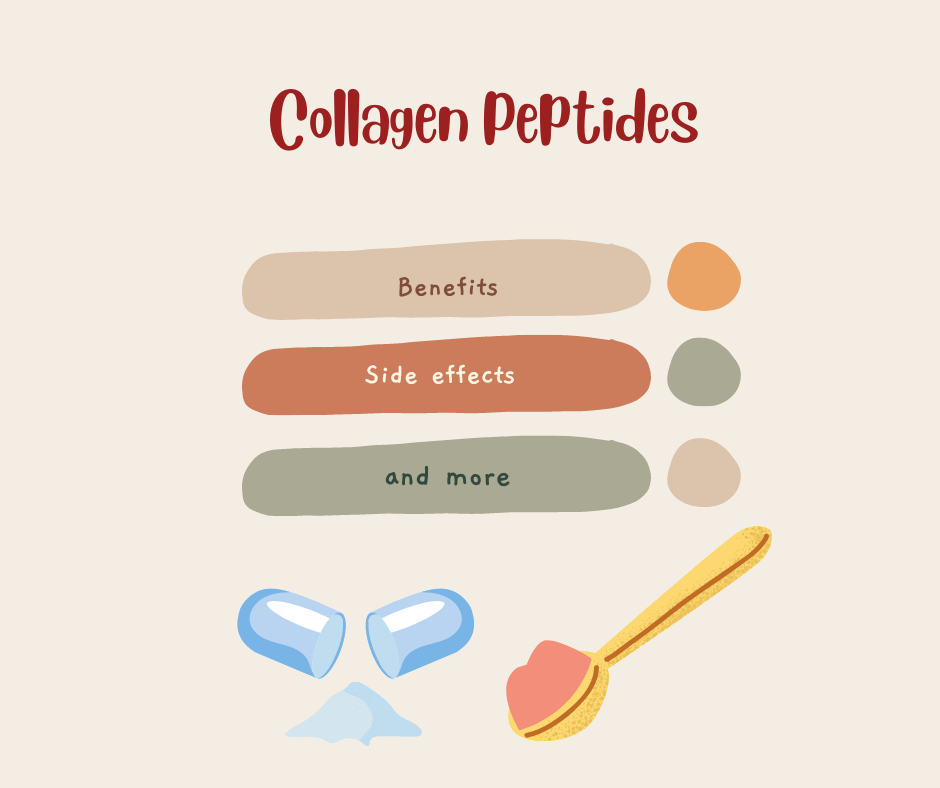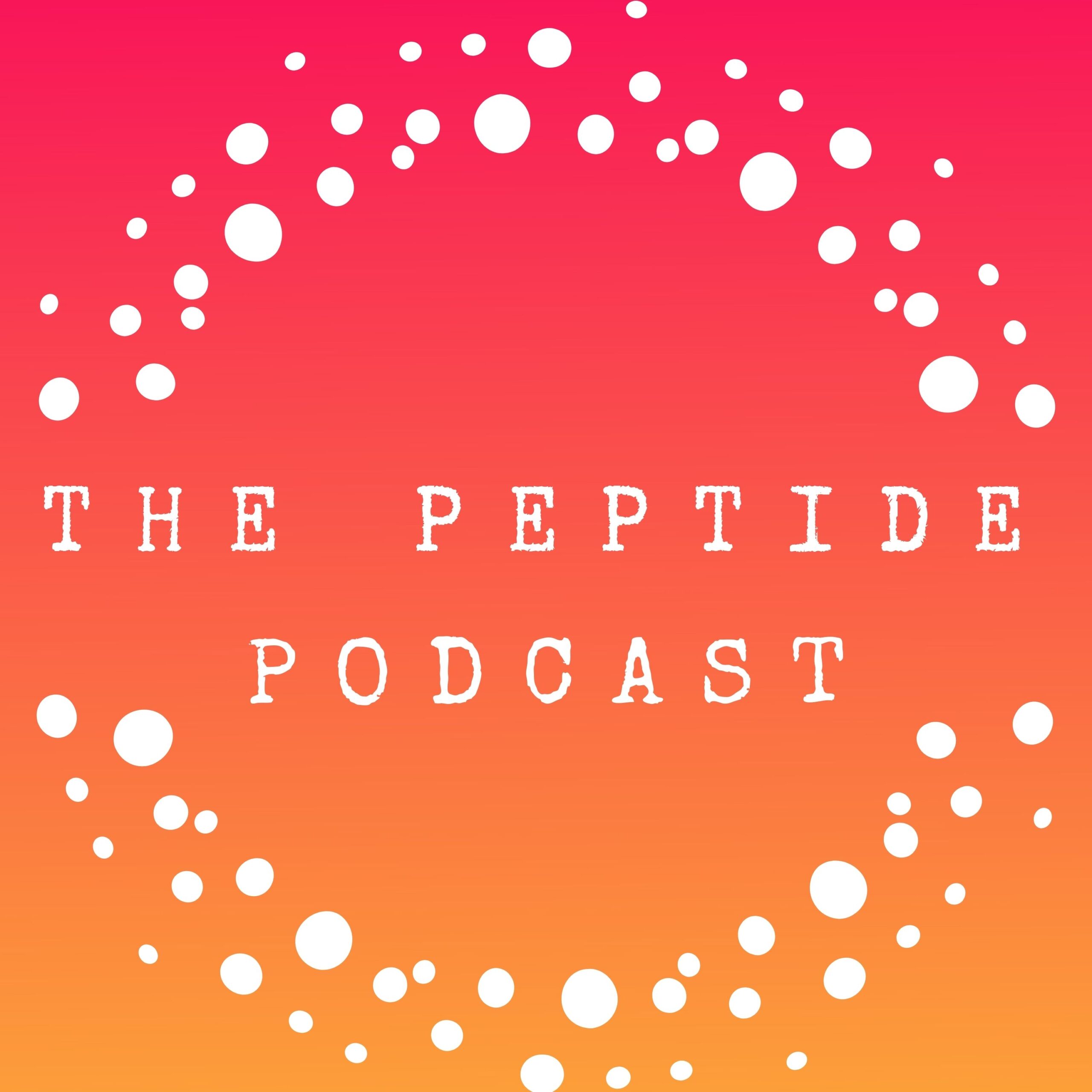Estimated reading time: 6 minutes
You’ve seen people adding collagen powder to everything from coffee to smoothies and baked goods. But how do collagen supplements work, exactly? Is one better than the other?
In this article, we’ll cover all there is to know about collagen peptides — what they are, their benefits, and their potential side effects.

What is collagen?
Simply put, collagen is a protein our bodies use to build and repair tissues. It’s the most abundant protein found naturally in your body. It provides structural support to our skin, blood vessels, and muscles. It is also found in our bones, teeth, and connective tissues (e.g., tendons, ligaments).
We make less collagen as we age, which affects our skin and our joints. But it can be hard to know where to start with so many products available. Before you buy a collagen supplement, there are some important things we think you should know. More on this below.
What are collagen peptides?
The collagen found in supplements isn’t exactly like the collagen found in your body. Collagen peptides, also known as hydrolyzed collagen, are collagen that’s been broken down into smaller parts that are easier to digest and dissolve.
What are the different types of collagen?
Our body needs different types of collagen to perform many functions. Our bodies are made up of 28 types of collagen. Most of it is type I, II, or III. Here’s a quick summary of these different types of collagen and where they are found
•Type I collagen: Found in your skin, bones, teeth, tendons, ligaments, blood vessels, and eyes. Type I collagen is commonly sourced from (made from) bovine (cow) or porcine (pig) tissues such as bones, tendons, or lungs. Other sources include marine (fish) tissues such as bone, skin, scales, or chicken bones and eggshell membranes (ESM).
•Type II collagen: Found in your cartilage, the tissue that protects your bones at your joints, your neck, and your spine. Type II collagen is commonly sourced from chicken cartilage.
•Type III collagen: Found in your muscles and blood vessels. Type III collagen is commonly sourced from bovine tissues.
What does a collagen peptide do for you?
Let’s face it. Our body changes as we age. And some of these changes, like fine lines and wrinkles, are annoying. But other changes to our bodies can cause serious problems in our daily life. Our bones and muscles may become weaker, affecting our coordination and balance.
While we haven’t discovered the fountain of youth just yet, the following is a list of some benefits you may receive from collagen peptide therapy:
Skin:
- Reduction of wrinkles
- Smoother, firmer-looking skin
- Increased hydration
- Increased skin elasticity
Nails:
Bones:
- Increase bone mineral density (BMD) (stronger bones)
- May help with osteoporosis (condition when bones become weak)
Joints:
- Decrease joint pain
- May help with osteoarthritis (a condition in which the cartilage and bone in joints of the hands, hips, and knees wear down over time)
Muscles:
- May boost muscle mass in aging men
Heart:
- May decrease risk for atherosclerosis (when plaque builds up on the walls of your arteries and causes the wall to thicken and harden)
How do I take collagen peptides?
Collagen peptides can be taken with or without food any time during the day. From powders, capsules, and gummies to liquid shots and collagen bars — there are so many options to choose from. It can be hard to know where to start with so many products available.
But, finding the right product type can go a long way. You’ll want to use a collagen peptide that’s convenient and works with your lifestyle. Do you like the convenience of swallowing capsules? Would you rather eat your collagen with your meal?
Collagen powders are versatile and offer a fun way to add collagen to your daily nutrition. The powders are easily added to your favorite hot or cold drink, baked goods, or mixed into your favorite dish (e.g., eggs, oatmeal, yogurt, and baked goods). Make sure to mix a scoop (or two) of your collagen peptide powder while you’re cooking your dish so the powder can dissolve.
Capsules may seem more convenient, but look at the label and check the dose. How many grams of collagen is in 1 scoop of collagen powder? Compare that to how many capsules you will need to get the same dose. Remember, capsules tend to be on the large side. If you struggle taking pills, this may not be the most fun part of your day.
Liquid shots are pre-measured and ready to drink, so you can skip the mixing or swallowing capsule routine.
The bottom line, the best way to take collagen peptides is what works best for you.
Is it safe to take collagen peptides every day?
Yes. Collagen peptides are generally well tolerated. As mentioned, collagen supplements are made from common food allergens such as fish (marine) and eggs (ESM). People with allergies to these foods should avoid these products made with these ingredients.
The following symptoms of food allergies are serious and should be reported to your healthcare provider immediately:
- Allergic reactions (e.g., skin rash, itching, hives, or swelling of face, throat, lips, or tongue)
- Trouble breathing
- Diarrhea
- Stomach cramps
- Lightheadedness
What is the best collagen peptide supplement?
Before you wander down the supplement aisle at your local pharmacy or troll the internet in the thick of all the information (or misinformation) — we’ve got you covered.
When looking for a collagen peptide supplement, choose products made with hydrolyzed collagen, so it’s easier for your body to digest and absorb the collagen peptides. Make sure the collagen is from grass-fed, hormone-free animals, so you’re using the healthiest, cleanest products.
Our favorite collagen peptide powder is Thorne® Collagen Plus.
What We Like:
•Gluten free
•Dairy free
•Soy free
•Derived from natural flavors and colors
•13 grams of grass-fed, hormone-free collagen per serving (1 scoop)
•Great passion berry flavor, low in sugar (2 grams per serving)
Is this the first time you’ve heard about peptides?
We’re huge advocates of using daily collagen peptide supplements in your routine to help with skin and nail and bone and joint health. But what about topical peptides for skin care to help with anti-aging? And what do you know about peptides when it comes to your overall health and wellness?
– – –
References
Clark, K.L., et al. (2008). 24-Week study on the use of collagen hydrolysate as a dietary supplement in athletes with activity-related joint pain. Current Medical Research and Opinion.
de Miranda, R.B., et al. (2021). Effects of hydrolyzed collagen supplementation on skin aging: A systematic review and meta-analysis. International Journal of Dermatology.
Review All References
Kovalainen, M., et al. (2015). Novel delivery systems for improving the clinical use of peptides. Pharmacological Reviews.
MedlinePlus. (2020). Drawing medicine out of a vial. National Library of Medicine.
MedlinePlus. (2020). Giving an IM (intramuscular) injection. National Library of Medicine.
MedlinePlus. (2019). Subcutaneous (SQ) injections. National Library of Medicine.
Minnesota Department of Health. (2019). Needle gauge resource list.
National Institutes of Health. (2012). Patient education. Giving a subcutaneous injection.
The University of Texas at Austin. (n.d.). Sharps safety.
Usach, I., et al. (2019). Subcutaneous injection of drugs: Literature review of factors influencing pain sensation at the injection site. Advances in Therapy.
U.S. Food & Drug Administration. (2021). Sharps disposal containers.
SLU-PP-332
Today we’re taking a closer look at SLU-PP-332, a compound that’s gaining attention for its potential role in performance support and metabolic health. If you’re interested in burning fat more efficiently, supporting your mitochondria, or taking your workouts to the next level, stick around—this one’s for you. What Is SLU-PP-332? Let’s start with the basics.…
Thymosin Alpha 1, Chronic Fatigue and Lyme Disease
Today we’re going to talk about thymosin alpa 1, what it is, how it works, and why some doctors are using it to help those with Lyme disease. What Is Thymosin Alpha 1? Let’s start with the basics. Now we’ve talked about thymosin alpha 1 before in the context of immune health, but as a…
Continue Reading Thymosin Alpha 1, Chronic Fatigue and Lyme Disease
What to Expect on GLP-1 Medications
Today we’re diving into a topic that’s been everywhere lately: GLP-1 medications like semaglutide and tirzepatide for weight loss. You may know them by names like Wegovy, Ozempic, Mounjaro, or Zepbound. I want to give you a clear, realistic picture of what to expect—because while the media loves to highlight the dramatic before-and-after photos, the…
5-Amino-1MQ
Today, we’re taking a close look at 5-Amino-1MQ—a compound gaining attention for its potential to improve fat loss, metabolic health, and longevity. We’ll break down how it works, the science behind it, and what that could mean for your health. Let’s get started. So, What Is 5-Amino-1MQ? Now, just to clear something up—5-Amino-1MQ isn’t actually…
Breaking Through GLP-1 Weight Loss Plateaus
Welcome to The Peptide Podcast. Today we’re going to talk about something that almost everyone on a GLP-1 journey hits eventually, the weight loss plateau. It starts like this: you begin a GLP-1 like semaglutide or tirzepatide, and for the first few weeks or months, the weight seems to fall off. You’re eating less, not…
Continue Reading Breaking Through GLP-1 Weight Loss Plateaus
Injectable L-Carnitine
In today’s episode we’ll talk about L-Carnitine. What is L-carnitine, what does it do, and why are more people choosing to inject it instead of taking it as a pill? Let’s break it down. L-carnitine is a compound made from the amino acids lysine and methionine, and its main job is helping your body turn…

Leave a Reply